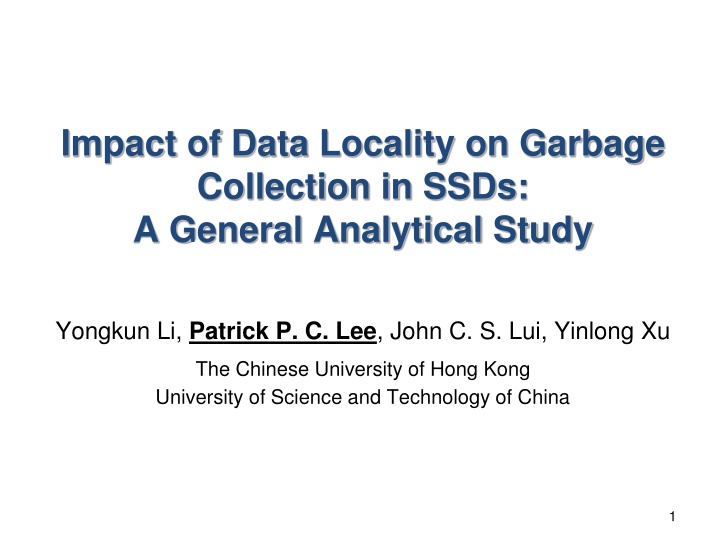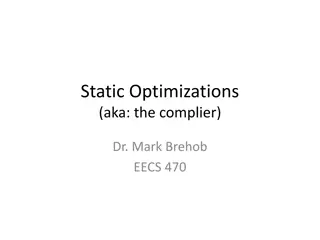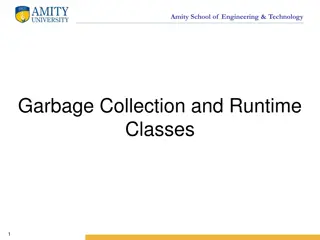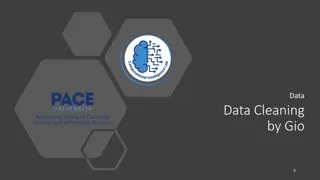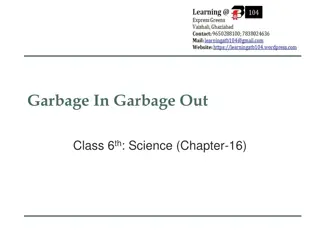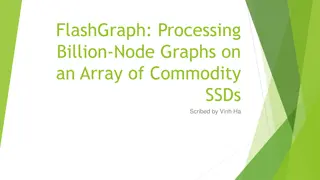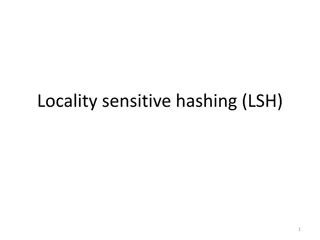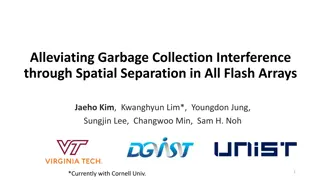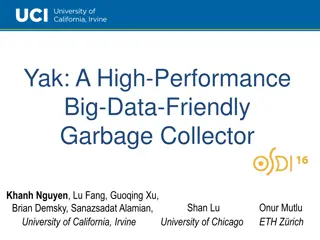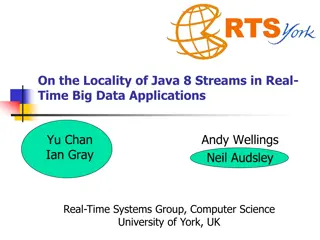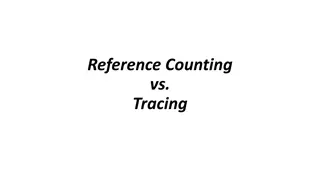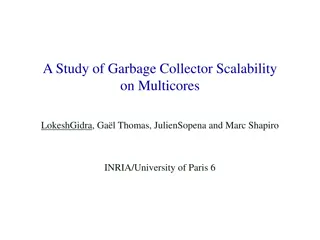Impact of Data Locality on Garbage Collection in SSDs: A General Analytical Study
SSDs, widely deployed in desktops and data centers, offer high throughput but face limitations due to garbage collection overhead. This study explores the impact of data locality on garbage collection performance in SSDs, highlighting challenges, motivation, and contributions of the research. The work focuses on characterizing GC performance under general workload conditions and proposes analytical frameworks for locality-oblivious and locality-aware GC algorithms. Various models and simulations are utilized to evaluate and improve GC efficiency in SSDs.
Download Presentation

Please find below an Image/Link to download the presentation.
The content on the website is provided AS IS for your information and personal use only. It may not be sold, licensed, or shared on other websites without obtaining consent from the author.If you encounter any issues during the download, it is possible that the publisher has removed the file from their server.
You are allowed to download the files provided on this website for personal or commercial use, subject to the condition that they are used lawfully. All files are the property of their respective owners.
The content on the website is provided AS IS for your information and personal use only. It may not be sold, licensed, or shared on other websites without obtaining consent from the author.
E N D
Presentation Transcript
Impact of Data Locality on Garbage Collection in SSDs: A General Analytical Study Yongkun Li, Patrick P. C. Lee, John C. S. Lui, Yinlong Xu The Chinese University of Hong Kong University of Science and Technology of China 1
SSD Storage Solid-state drives (SSDs) widely deployed e.g., desktops, data centers Pros: High throughput Low power High resistance Cons: Limited lifespan Garbage collection (GC) overhead 2
Motivation Characterizing GC performance is important for understanding SSD deployment We consider mathematical modeling: Easy to parameterize Faster to get results than empirical measurements 3
Challenges Data locality Data access frequencies are non-uniform Hot data and cold data co-exist More general access patterns are possible (e.g., warm data [Muralidhar, OSDI 14]) Wide range of GC implementations 4
Two Questions What is the impact of data locality on GC performance? How data locality can be leveraged to improve GC performance? 5
Our Contributions A general analytical framework that characterizes locality-oblivious GC and locality-aware GC A non-uniform workload model A probabilistic model for a general family of locality- oblivious GC algorithms A model for locality-aware GC with data grouping Validation and trace-driven simulations 6
Related Work on GC Theoretical analysis on GC Hu et al. (SYSTOR09), Bux et al (Performance10), Desnoyers (SYSTOR12): model greedy algorithm on GC Li et al. (Sigmetrics13): model design tradeoff of GC between performance and endurance Benny Van Houdt (Sigmetrics13, Performance13): model write amplification of various GC algorithms under uniform workload and hot/cold workload Yang et al. (MSST14): analyzing the performance of various hotness-aware GC algorithms Our work focuses on the impact of data locality on GC performance under general workload 7
How SSDs Work? Organized into blocks Each block has a fixed number (e.g., 64 or 128) of fixed-size (e.g., 4-8KB) pages Three basic operations: read, write, erase Read, write: per-page basis Erase: per-block basis Out-of-place write for updates: Write to a clean page and mark it as valid Mark original page as invalid 8
How SSDs Work? Garbage collection (GC) reclaim clean pages Choose a block to erase Move valid pages to another clean block Erase the block 2. erase 0 1 2 Block A Block A 1. write 0 2 Block B Block B Before GC After GC Limitations: Blocks can only be erased a finite number of times SLC: 100K, MLC: 10K, 3 bits MLC (several K to several hundred) GC introduces additional writes (cleaning cost) Degrades both performance and endurance 9
Workload Model Clustering Only a small proportion of pages are accessed Let ?? be proportion of logical pages that are active Skewness Access frequency of each page varies significantly ? access types Two vectors: ? = ?1,?2, ,??,? = (?1,?2, ,??) type-?pages account for a proportion ?? of active pages and are uniformly accessed by a proportion ?? of requests Both clustering and skewness are observed in real-world traces 10
GC Algorithms Greedy Random Algorithm (GRA) Defined by a window size parameter ? Two steps to select a block for GC First select ? blocks with the fewest valid pages (greedy) Then uniformly select a block from the ? blocks (random) Special cases ? = 1: GREEDY algorithm ? = N: RANDOM algorithm 11
Locality-oblivious GC Write and GC process with single write frontier One block is allocated as the write frontier at any time Writes are sequentially directed to write frontier Internal writes: due to GC External writes: due to workload Write frontier is sealed until all clean pages in the block are used up Another clean block is allocated as write frontier GC is triggered to reclaim a block 12
State of Blocks ?: total number of pages in a block ??? : average number of type-? valid pages in the block chosen for GC ??? : Internal page writes (page writes due to GC) Sum of ??? 13
State of Blocks Approximation: ? candidate blocks are chosen from the ? blocks sealed in the earliest time Earlier sealed blocks have fewer valid pages on average 14
General Analysis Framework Average cleaning cost in each GC is ?? is number of active blocks and ??? can be computed via where ?(?) is a function of ?, ??,?? and ?? GC cleaning cost is affected by GC algorithms and workload locality (both clustering and skewness) 15
Case Studies GRA with window size ? = ?(?) Includes the case of GREEDY (? =1) GRA with window size ? ?? Includes the case of RANDOM (? = ?) GRA with window size ? = ??? 16
Locality-aware GC Differentiating data reduces GC cleaning cost Consider locality-aware GC using data grouping Differentiating different types of data pages Storing them separately in separate regions Issues to address: How data grouping influences the GC performance How much is the influence for workloads with different degrees of locality 17
System Architecture The whole SSD is divided into ? + 1 regions Each region is used to store one particular type of data The ? + 1 regions can be viewed as ? + 1 independent sub-systems Each of the first ? sub-systems is fed with a uniform workload Previous analysis on locality-oblivious GC can be applied in each region 18
Model Validation DiskSim + SSD extension developed by Microsoft Workloads: Skewed workload: ??= 0.1,? = 2,? = Fine-grained workload: ??= 0.1,? = 0.4,0.3,0.2,0.1 ,? = (0.2,0.2,0.3,0.3) 0.8,0.2 , ? = (0.2,0.8) Fine-grained workload Skewed workload Our model matches simulation results 19
Impact of Data Locality on Locality-oblivious GC Impact of skewness Impact of clustering Cleaning cost increases as either the active region size or skewness increases The increase is more pronounced for a smaller ? GREEDY algorithm shows the most increase Data locality has no impact on RANDOM algorithm 20
Trace-driven Evaluation Locality-aware GC Locality-oblivious GC Locality-oblivious GC GREEDY (RANDOM) gives the best (worst) performance GREEDY has the most varying performance across workloads Locality-aware GC Cleaning cost can be significantly reduced with data grouping The further reduction is marginal when data is classified into more types
Summary Propose a general analytical model to study the impact of data locality on GC performance Analyze various locality-oblivious GC under different workloads Analyze the impact of locality-awareness with data grouping Conduct DiskSim simulation and trace-driven evaluations Cleaning cost depends on clustering/skewness, and impact varies across algorithms Data grouping efficiently reduces the cleaning cost Different spare block allocations show significant differences Future work More validation beyond DiskSim simulations GC implementation in SSD-aware file systems 22
Thank You! Contact: Patrick P. C. Lee http://www.cse.cuhk.edu.hk/~pclee 23
Backup 24
Analysis on locality-aware GC One design issue of locality-aware GC How many spare blocks should be allocated to each region Allocation ? = ?1,?2, ,??: proportion ??of spare blocks are allocated to region ? Average cleaning cost of locality-aware GC with GREEDY algorithm in region ? is Allocation of spare blocks affects the cleaning cost of locality-aware GC 25
Performance Gain with Locality Awareness Data grouping effectively reduces GC cleaning cost Spare block allocation has significant impact on the performance of locality-aware GC The impact decreases as the clustering increases The impact increases as the skewness increases 26
